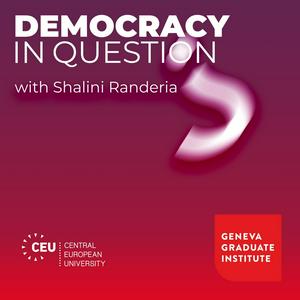Katha Pollitt on Gendered Politics in the United States
Democracy in Question? is brought to you by:• Central European University: CEU• The Albert Hirschman Centre on Democracy in Geneva: AHCD• The Podcast Company: scopeaudio Follow us on social media!• Central European University: @weareceu.bsky.social• Albert Hirschman Centre on Democracy in Geneva: @ahcdemocracy.bsky.social• Our guest: @kathapollitt.bsky.social Subscribe to the show. If you enjoyed what you listened to, you can support us by leaving a review and sharing our podcast in your networks! GLOSSARYIncels (p. 5 in the transcript, 19:50)Incel is a member of an online subculture of primarily heterosexual men who identify as being unable to have romantic or sexual relationships. This self-described inability to form attachments is often expressed as grievance toward women. Incel subculture has been associated with misogyny, extremism, rape culture, and expressions and acts of violence. Incels are a subset of the “manosphere,” which includes other online communities animated by sexism and hostility toward women, such as pickup artists, Men Going Their Own Way (MGTOW), and men’s rights activists. The Southern Poverty Law Center classifies incels as a hate group and identifies them as part of the online male supremacist ecosystem. The term incel was initially coined by a woman. Known only by her first name, a Canadian woman named Alana began using the term invcel (later shortened to incel) in 1997 to connect with other singles struggling with social awkwardness. She documented her experiences on her personal website, “Alana’s Involuntary Celibacy Project,” which became a forum for people struggling to form romantic relationships. In 2000 Alana stopped participating in the project, and she has since said that she feels uncomfortable with how the term has been hijacked. As incel communities began to establish themselves on the forum-based websites Reddit and 4chan, the term shifted from its initial meaning. By 2010 incel was associated with misogynistic trolling and threats of violence by men’s rights groups operating on fringe right-wing platforms. In 2017 Reddit banned a particularly active subreddit called r/incels for violating Reddit’s rule against content that “encourages, glorifies, incites, or calls for violence or physical harm against an individual or group of people.” source Me Too movement (p. 7 in the transcript, 26:22)Me Too movement is an awareness movement around the issue of sexual harassment and sexual abuse of women in the workplace that grew to prominence in 2017 in response to news reports of sexual abuse by American film producer Harvey Weinstein. While the phrase had been in the lexicon for more than a decade, a tweet by American actress Alyssa Milano sparked a social media phenomenon that raised awareness, gave voice to survivors, and led to sweeping cultural and workplace changes. The movement is credited with giving visibility to the scope of sexual violence within the United States and across the world. It is also defined by a push for accountability, including examining power structures in the workplace that had enabled misconduct, and, in some cases, renewed efforts to seek justice for survivors through criminal and civil court systems. In the first year of the movement, numerous prominent men lost their jobs after they were publicly accused of wrongdoing. Since then, the Me Too movement’s legacy has broadened to encompass issues related to gender equity in the workplace and legal reforms to eliminate barriers that had prohibited victims from coming forward. Some U.S. states have since abolished statutes of limitations for reporting sexual crimes and banned nondisclosure agreements (NDAs) that aimed to keep misconduct allegations from the public’s view. The movement has also led to changes in the workplace and society at large through the implementation of greater safeguards and educational tools that aim to change behavior in future generations. source

